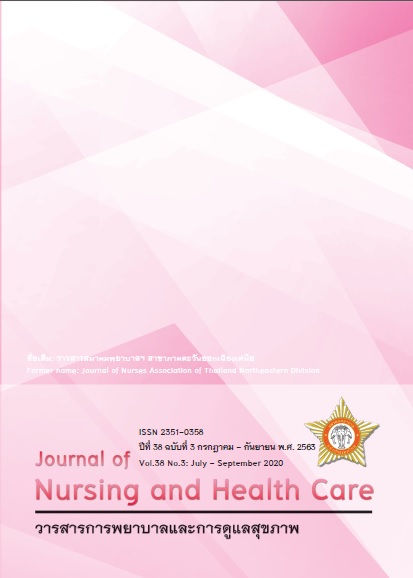การปรับตัวของครอบครัวที่มีวัยรุ่นติดยาเสพติด
คำสำคัญ:
Family Adaptation, Family, Adolescent with Addictionบทคัดย่อ
This multi-cases study was aimed to study family adaptation among adolescent with addiction. The participants consisted of 5 families of adolescents with addiction. The family resiliency concept was applied. The study tool consisted of family adaptation interview guideline and family coping questionnaire. The content validity was checked by five experts; CVI 0.78 and 0.7 sequentially. The study tools was tried out with 10 similar families for feasibility. Content analysis was done for analyzing data.
The family consisted of 3 mothers and 2 grandparents aged between 35–70 years. All addiction adolescents were boys. Their income was not sufficient and had debt. The family stressor is their adolescents was addiction and not quit. The vulnerability was parental separation, low parenting practice and poor relationships, including, community having more drug abusers and selling it. The families were suffering and shame. Family coping had attempted to cover up. They consulted only with health personnel. The family function and relationships were not adjusted during therapy. They had just worked for making money and did not improved their parenting role. Only one family had planned for adolescent study and work for good future life
As the finding, health personnel who involve with therapy and rehabilitation process should develop caring and promoting method for positive family adaptation, especially, increasing effective parenting and good relationship for supporting adolescents quitting from addiction successfully.
Downloads
เอกสารอ้างอิง
เฉลิมศรี ราชนาจันทร์, &ศรีวรรณ มีคุณ. (2553). ปรากฏการณ์ชีวิตของเยาวชนผู้เสพยาบ้า. วารสารการศึกษาและการพัฒนาสังคม, 6(1), 81-94.
ดารุณี จงอุดมการณ์. (2558). การพยาบาลสุขภาพครอบครัว: แนวคิดทฤษฎีและการประยุกต์ใช้ในครอบครัวระยะวิกฤต. พิมพ์ครั้งที่ 2. ขอนแก่น: บียอนด์ เอ็นเตอร์ไพรซ์.
มนัส สุนทรโชติ, & เพ็ญพักตร์ อุทิศ. (2556). ปัจจัยคัดสรรที่สัมพันธ์กับพลังต้านการเสพยาบ้าของวัยรุ่นที่เข้ารับการบำบัดแผนกผู้ป่วยนอกโรงพยาบาลในเขตภาคตะวันออก.วารสารการพยาบาลจิตเวชและสุขภาพจิต, 27(2), 85-98.
ยุพา จิ๋วพัฒนกุล. (2553). การพยาบาลครอบครัว. นครปฐม: ภาพพิมพ์.
รุจา ภู่ไพบูลย์. (2541). การพยาบาลครอบครัว แนวคิด ทฤษฎี และการนำไปใช้.กรุงเทพฯ: วีเจพริ้นติ้ง.
ศูนย์วิชาการด้านยาเสพติด. (2555). ผลกระทบของสารเสพติด. ค้นเมื่อ 22 กุมภาพันธ์ 2559, จาก http://nctc.oncb.go.th
สำนักพัฒนาการป้องกันและแก้ไขปัญหายาเสพติด, &สำนักงานคณะกรรมการป้องกันและปราบปรามยาเสพติด. (2555). พลังครอบครัวเอาชนะยาเสพติด.กรุงเทพฯ: บางกอกบล็อก.
อรพิน กลิ่นพยูร, อำนาจ พิพัฒน์พิทยาสกุล,& มาลี จิรวัฒนานนท์. (2553). สภาพการดำเนินชีวิตครอบครัวเด็กติดยาเสพติด และบริการทางสังคมสาหรับครอบครัว. ค้นเมื่อ 22 กุมภาพันธ์ 2559, จาก http://thaifamilystudy.com
อุมาพร ตรังคสมบัติ. (2544). จิตบำบัดและการให้คำปรึกษาครอบครัว. พิมพ์ครั้งที่ 5. กรุงเทพฯ: ซันต้าการพิมพ์.
Nora, D., &Volkow, M.D. (2018). The science of drug use and addiction: The basics.Retrieved November 5, 2018, from http://www.drugabuse.gov
Virasiri, S. (2008). Establishing integrity: Parenting process among parents of healthy adolescents. Doctor of Philosophy Dissertation in Nursing Science, Faculty of Nursing, Chulalongkorn University.



